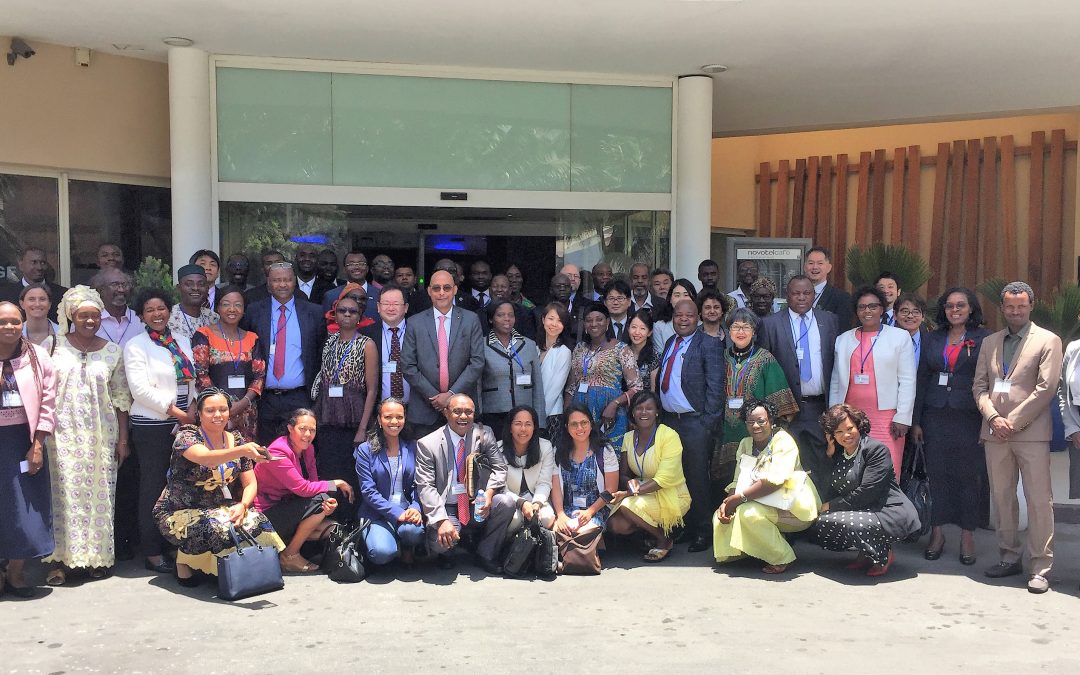Combating malnutrition is increasingly recognized as one of the most cost-effective development strategies in the world. This is because malnutrition causes significant economic losses estimated at 11% of the Gross Domestic Product (GDP) per year in both Africa and Asia. The Initiative for Food and Nutrition Security in Africa (IFNA) was launched as a continental platform to tackle hunger and malnutrition in Africa.
To date, up to April 2018, IFNA conducted:
- preparatory surveys from May to October 2017; and
- ICSA development workshops from February to May 2018
- in all ten (10) participating countries.
The ICSA development workshops served to help draft ICSA in a government-led, participatory and multi-sectoral manner.
The ICSA Consultative Workshop was held for mutual learning amongst participating countries and development partners, and to elaborate on their ICSAs. It was held in Dakar, Senegal, from 25 to 27 April 2018.
The overall objective of the workshop was to provide the participating countries with an opportunity to learn from each other by exchanging lessons learnt, and to prepare for the next step, being the finalisation and validation/formalisation of ICSA in each country towards their actions. The specific objectives were:
- To share lessons learnt from the experiences of preparation of a draft ICSA, including focus areas, both in terms of nutrition issues and geographical area, and a list of potential interventions that would be translated into project concepts;
- To have mutual learning and to create an opportunity to share suggestions and recommendations amongst the participating countries and organisations of the IFNA Steering Committee and other development partners; and
- To share the way forward in finalising the draft ICSA towards project formulation.
More than 69 people participated in the workshop, including 29 from the ten (10) IFNA-participating countries, 40 of the IFNA Steering Committee organisations such as FAO, IFAD, JICA, JIRCAS, NEPAD, UNICEF, WFP, WHO, international research institutes and various NGOs.
The workshop was composed of a three-day programme:
Day 1: SHARING & MUTUAL LEARNING ON THE DRAFT ICSA
Each participating country made a country presentation. The aim of these presentations was to share the results of ICSA development workshop and to have a better understanding of each country in the context of nutrition.
Day 2: NUTRITION IMPROVEMENT THROUGH MULTI-SECTORAL APPROACH
This session was aimed at gaining a better understanding of how a multi-sectoral approach could be an effective means to accelerate nutrition improvement by having;
- interactive learning;
- thematic discussions (Multi-sectoral coordination, resource alignment/mobilization, effective NSA programming to reduce undernutrition); and
- a reporting session.
Day 3: TOWARDS ACTIONS ON THE GROUND
Having various chances to learn from the ten (10) different countries and development partners including UN agencies, financial and research institutions and NGOS for the last two days, country representatives made their summary presentations, which included:
- their own good practices from which other participants could learn;
- what they learned from the others; and
- action lists to formalise ICSAs in all countries.
Finalisation and validation of ICSA confirms how each country would formalise/validate the ICSA in that country in the next several months.
During the workshop, each country successfully shared and obtained good practices around an enabling environment within governments, an effective nutrition improvement approach that might be contextualised and introduced in other participating countries and principles to promote multi-sectorality in nutrition improvement.
Dr Mayaki (NEPAD’s CEO) delivered his speech on Day 1, saying that “nutrition is complex, but it is about lives, which means there is an ethical responsibility. If we do not take care, we are killing lives. This is why a multisectoral approach with an array of solutions remains imperative”. He expressed his expectation as “IFNA is to accelerate and scale up actions to make hunger a phenomenon of the past. IFNA will strive to strengthen coordination amongst actors and partners for direct delivery of interventions on the ground. This differentiates IFNA from the ordinary approach”.

Recent Comments